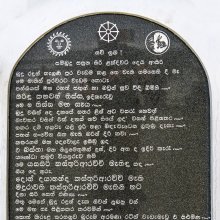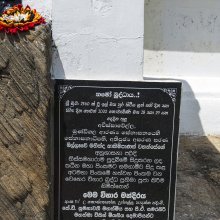Bu, Bū: 5 definitions
Introduction:
Bu means something in the history of ancient India, Marathi, Jainism, Prakrit, Hindi, biology. If you want to know the exact meaning, history, etymology or English translation of this term then check out the descriptions on this page. Add your comment or reference to a book if you want to contribute to this summary article.
Images (photo gallery)
India history and geography
Source: Cologne Digital Sanskrit Dictionaries: Indian Epigraphical GlossaryBu.—d8hāleṅkā (IE 8-3), Od8iyā; same as Mahāpādamūlika, ‘chief attendant.’ Note: bu is defined in the “Indian epigraphical glossary” as it can be found on ancient inscriptions commonly written in Sanskrit, Prakrit or Dravidian languages.
--- OR ---
Bu.—d8ī, Bengali name for a unit equal to 5 gaṇḍās; cf. voḍī, voḍrī, kapardaka-voḍī; also kākinī. Note: bu is defined in the “Indian epigraphical glossary” as it can be found on ancient inscriptions commonly written in Sanskrit, Prakrit or Dravidian languages.

The history of India traces the identification of countries, villages, towns and other regions of India, as well as mythology, zoology, royal dynasties, rulers, tribes, local festivities and traditions and regional languages. Ancient India enjoyed religious freedom and encourages the path of Dharma, a concept common to Buddhism, Hinduism, and Jainism.
Biology (plants and animals)
Source: Google Books: CRC World Dictionary (Regional names)1) Bu in Liberia is the name of a plant defined with Oryza sativa in various botanical sources. This page contains potential references in Ayurveda, modern medicine, and other folk traditions or local practices It has the synonym Oryza sativa var. flavoacies Kara-Murza ex Zhuk. (among others).
2) Bu in Thailand is also identified with Melocalamus compactiflorus It has the synonym Pseudostachyum glomeriflorum Kurz (etc.).
Example references for further research on medicinal uses or toxicity (see latin names for full list):
· Journal de Botanique, rédigé par une société de botanistes (1813)
· J. SouthW. Agric. Univ. (1994)
· Proceedings of the Indian Science Congress Association (1987)
· Chin. J. Rice Sci. (1996)
· Journal of Wuhan Botanical Research (1985)
· J. Agric. Trop. (1956)
If you are looking for specific details regarding Bu, for example side effects, chemical composition, health benefits, pregnancy safety, extract dosage, diet and recipes, have a look at these references.

This sections includes definitions from the five kingdoms of living things: Animals, Plants, Fungi, Protists and Monera. It will include both the official binomial nomenclature (scientific names usually in Latin) as well as regional spellings and variants.
Languages of India and abroad
Marathi-English dictionary
Source: DDSA: The Molesworth Marathi and English Dictionarybū (बू).—m (Usually bāū) A word used to frighten children; corresponding with hobgoblin, boggle, bogie &c. 2 In nursery language. Milk. 3 Arrogant or empty show; vain display or pretence. bū bāhēra paḍaṇēṃ, bū dākhaviṇēṃ &c. are used as the similar phrases under pōma. bū dākhaviṇēṃ is further To intimidate or menace; to exhibit some bū or phantom to terrify and deter: also to display some hollow appearance of a good thing. In this sense bū is from a little story about a cat, and lōṇyācā gōḷā & kāpasācā bū.
Marathi is an Indo-European language having over 70 million native speakers people in (predominantly) Maharashtra India. Marathi, like many other Indo-Aryan languages, evolved from early forms of Prakrit, which itself is a subset of Sanskrit, one of the most ancient languages of the world.
Hindi dictionary
Source: DDSA: A practical Hindi-English dictionaryBū (बू):—(nf) a disagreeable smell/odour, foul smell; -[ānā] to stink, to smell, to give a foul smell; to suspect (presence of); -[na jānā] (as [navābī kī ] 0) not to get rid of, to continue to entertain feelings of.
...
Prakrit-English dictionary
Source: DDSA: Paia-sadda-mahannavo; a comprehensive Prakrit Hindi dictionaryBū (बू) in the Prakrit language is related to the Sanskrit word: Brū.
Prakrit is an ancient language closely associated with both Pali and Sanskrit. Jain literature is often composed in this language or sub-dialects, such as the Agamas and their commentaries which are written in Ardhamagadhi and Maharashtri Prakrit. The earliest extant texts can be dated to as early as the 4th century BCE although core portions might be older.
See also (Relevant definitions)
Starts with (+2716): Bu bogel, Bu bun bu togan, Bu bunkut, Bu daha, Bu dank, Bu dienke, Bu diing, Bu dimb, Bu falal, Bu fatikay, Bu fulun, Bu gerete, Bu gerete ebe, Bu gilay, Bu gongo, Bu hunuk, Bu jie, Bu kunden, Bu lata, Bu lev.
Ends with (+1692): Aadambu, Aambu, Abbu, Abhishavambu, Abhishekambu, Abu, Abubu, Acababu, Acaikampu, Acaikompu, Acarababu, Acchambu, Accukkampu, Acumpu, Adabbu, Adabu, Adalabu, Adambu, Adamkabu, Adar ganchi hambu.
Full-text (+552): Jambunada, Arjavi, Bru, Bu senget bu it, Grihin, Bu nis, Bu lev, Bu telen, Bu mumuno, Bu bogel, Bu pendipinde, Bu bun bu togan, Bu gerete, Bu gerete ebe, Alabu, Bu dienke, Bu saet, Bu songay, Bu tulao, Dam bu.
Relevant text
One of your search terms exceeds the minimun character amount per search term. This amount currently equals 2.
No search results for Bu, Bū in any book or story.

